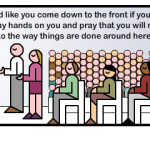We run our website the way we wished the whole internet worked: we provide high quality original content with no ads. We are funded solely by your direct support. Please consider supporting this project.

A Cross-Like Church
When God’s church loves like God loves—which means valuing the other at cost to self—it will puzzle those outside the church. While such love might cause the religious to rail with outrage, it will cause the searching and the hungry to ask, “how can people love like this?” In God’s plan, this puzzle is what prepares people to believe that Jesus Christ is Lord and to surrender their lives to him.
The evangelistic task of the Christian community, in other words, is to live and love in a way that draws people and cries out for explanation. Our proclamation only has as much credibility as our love requires explanation.
For too long the church has blamed the world for how ineffective it is at attracting people. Evidence that we have failed to love like God loves is found in the long-standing pattern of the church deflecting responsibility for its own sin and placing it on the world. If people are not being drawn to the Lord by the church’s love, this is the fault of the church. For Jesus taught us from the start that it is by our love, not just by our words, that people will know he is real and be drawn into a relationship with him. Christ convinced us of the love of God by demonstrating it on the cross while we were still sinners (Romans 5:8). We are called to do the same toward others.
By God’s own design—a design that recaptures the purpose for which God created the world—hurting and hungry people are to be drawn into the reality of God’s cross-like love by seeing it demonstrated in his body. Christ did this in his earthly body, which is why sinners were attracted to him. And he longs to do this again through his church body.
To the extent that the church embodies the spirit of Jesus as ultimately displayed on the cross, it will be a magnet for the hurting and the outcast.
On the other hand, to the extent that the church embodies a judgmental, critical spirit that sets up a perimeter, it will repel them.
This means that the church must be freed from any obsession with determining or developing rules that assess who is “in” and who is “out.” It must be ok with wheat and weeds growing alongside each other (Matt 13). When a church is focused on defining the perimeter that establishes boundaries for who is right and who is wrong, it will to some extent be getting its fulfillment and life from what it is “against,” rather than what is it “for.”
Sadly, far too many churches acquire their sense of worth and identity by their religious self-identity, where there is constant judgment and assessment whether people believe the right things and act the right ways. When we define Christianity as “standing up for God” or defending a specific version of orthodoxy, we are focusing on the perimeter, not the cross of Christ. And as a result, we fall short of loving like God loves.
Churches will only embody and demonstrate to the world the cruciform life of Christ when we are defined by the center of God’s cruciform love. This empowers them to let go of any attempt to get life from their perimeter. They don’t need to police the perimeter to ensure that everyone looks and believes exactly as they do.
As a result, a church that lives out of the center of the cross is willing to have their reckless love scorned by the religious rule-keepers as compromising, relativistic, liberal, soft on doctrine, or anti-religious. After all, what kind of church attracts and embraces those who are judged by the religious, i.e. prostitutes, drunkards, those from the LGBT community, and drug addicts? In such a church, the perimeter between those who are “in” and those who are “out” is blurred, as seekers find love without judgment, and they have a gnawing suspicion that this is that for which they were created.
Adapted from Repenting of Religion, pages 198-200
Photo credit: Jesper Yu via Visualhunt.com / CC BY-NC-ND
Category: General
Tags: Church, Evangelism, Love
Topics: Following Jesus
Related Reading

Is Having the “Right” Theology the Core of Christianity?
Last week, we posted a piece by Greg that challenges the practice being violent “in the name of Jesus” toward others who err theologically. (Click here to read this post.) Being that this piece got a lot of attention, we thought it worthwhile to provide some further explication to this point, especially in the light…

Cross-like Love and Non-Violence
Cosmo Spacely via Compfight Though it seems to have been forgotten by many today, the cross wasn’t simply something God did for us. According to the NT, it was also an example God calls us to follow. Hence, after John defined love by pointing us to Jesus’ death on the cross on our behalf, he…

Confronting Divine Determinism
Part of the fallen human condition inclines us to shirk our moral responsibility and accept that everything is predetermined, whether by God, the gods, fate, or blind chance. Various forms of determinism have been prevalent in most primitive religions, in much ancient philosophy, in most forms of Islam and even, most surprisingly, in much traditional…

God’s Aikido Way of Defeating Evil
Greg continues his thoughts on the atonement with this installment highlighting the way God uses the evil intentions and actions of his enemies to bring about good. And because this strategy is based in love, the demons who encountered Christ could not possibly imagine what he was up to. They ended up participating in their…

Was Jesus Abandoned by the Father on the Cross?
As Jesus hung on the cross, he cried, “Eli, Eli, lema sabachthani?” (Mt 27:46). This is the cry of our God who stooped to the furthest possible depths to experience his own antithesis, as the all-holy God becomes the sin of the world (2 Cor 5:21) and the perfectly united God becomes the curse of…

